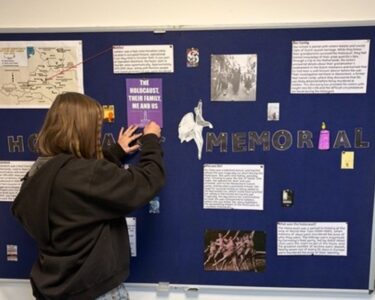by Ruth-Anne Lenga, Associate Professor, UCL Centre for Holocaust Education.
Back in June 2023, this country lost one of its greatest humanitarians and achievers, Holocaust survivor and leader of the British Holocaust survivor community, Sir Ben Helfgott. After spending much of his childhood evading death at the hands of the Nazis, in the ghetto of his Polish hometown of Piotrkow, and the concentration camps of Buchenwald and Theresienstadt, he ended his long life peacefully, at the age of 93, after spending his post- war years honouring the memory of those who were not so lucky. He died in the safety and warmth of his own bed, at his home, surrounded by his loving wife, only surviving sister, three sons, daughters-in-law, and his grandchildren.
Ben was a formidable figure and was unstoppable in his intrepid mission to ensure that those who perished during the Holocaust would never be forgotten. He worked for the welfare and wellbeing of fellow survivors and advocated with unparalleled determination that education about the Holocaust must be taught in schools. He was driven by the belief that the suffering and tragedy that befell him, his sister Mala and the family members who were murdered, should never happen again to anyone, and that education was the key.
Ben took this ambition to the highest level, well over 30 years ago, resolute to prevail on government to secure the study of the Holocaust as a compulsory component of the English national curriculum. This was, by no means, a foregone conclusion but his powers of persuasion, together with the dedication of other significant individuals, was a gamechanger. I was a young teacher at the time. I watched it all unfold. It was Ben’s pioneering work and tenacious spirit that inspired me, and others no doubt, to begin working in this field. Our friendship grew. He became my mentor. His teachings and example became the values that underpinned the establishment of the UCL Centre for Holocaust Education when Professor Stuart Foster and I established it in 2008, with the vision and support of the Pears Foundation and the Department for Education.
What I found particularly fascinating was Ben’s ability to lead the 732 young, Jewish, concentration camp survivors when they came to this country after the war, having lost everything and everyone dear to them. A teenager himself, Ben helped this group of orphaned boys and girls, who nick-named themselves, ‘The Boys’, to be open to find meaning in their lives going forward, and to see that life must be joyous, despite the acute pain and longstanding trauma they endured. Ben refused to be consumed by hate. Instead, he chose to celebrate the gift of life, and ‘The Boys’ followed his lead. With indominable spirit they built lives for themselves and created their own unique social group called ‘The 45s’, (1945 being the momentous year of their liberation). And the group still operates today. Ben’s dear friend and fellow teenage survivor, Harry Spiro, has said of that early time: ‘There was no such thing as counselling… I say we never needed counselling, we had the ‘45 group, and we had Ben’.
With Ben at the helm, the youngsters established one another as their post-war family; unshakable, and forever united. No one would come between them, although I am sure there were some internal battles, as there are with any family.
Ben’s athleticism and physical fitness inadvertently positioned him as, ‘the one to look up to’, an accolade he didn’t seek to acquire, but one he nonetheless took on with a deep sense of responsibility. Following the years of dehumanisation and victimisation to which the young survivors had been subjected, his physical strength must have been quite something to behold and, I suspect, elevated the group’s collective and individual self- identity. It’s hard to believe that just a few years after the end of the war – following starvation, near-fatal beatings, and other unimaginable cruelty, Ben was representing Britain at the Olympics as captain of the weightlifting team and a record holder. An archive photo shows Ben holding up the bar of iron weights, with colossal leg muscle supporting his solid frame, refusing to succumb and let the weights fall. The image, now iconic, captures not just Ben’s Samson-like strength but his fortitude to hold up survival itself, to sustain the memory of those who were murdered and to give back to the country which took him and his fellow survivors in and gave them a home. His patriotism to Britain was a massive part of his identity.
It was thus extremely profound that King Charles wrote from Buckingham Palace, on 18th June 2023, a heartfelt letter to Ben’ s family stating his sorrow at the news of Ben’s passing. The two-page letter included these words: ‘(Ben’s) example and especially his relentless determination to combat hate within society remains a model for us all’.
What King Charles may not have known is how Ben gave many survivors the courage to speak about their experiences during the Holocaust. It’s unimaginable what pain and fear survivors must experience when recounting their story, reliving the nightmare. How could we ever come close to knowing? Yet, they found, with Ben’s quiet coercion and ‘lead-by- example’ approach, together with their own resolve, the bravery to do it. As a result, Ben was directly instrumental in two generations – including hundreds of thousands of this country’s school students and teachers, to have the rare and educationally powerful opportunity to hear, first-hand, what happened during the Holocaust.
Countless more generations will still have this chance, through the recordings that have been made of survivors bearing witness, some via virtual 3D digital technology. Solly Irving who passed away some years ago told me that he couldn’t have done it without Ben. Solly, after years of not feeling able to uncover the wounds and speak publicly of his traumatic past, managed, in the end, to do so. With considerable courage he gave talks to thousands of young people and became a much loved, annual guest speaker of secondary schools across Plymouth. Following several heart-to-heart conversations with Solly, I was left wondering whether the process of giving these talks, difficult as it must have been, gave him in turn, a strong sense of universal purpose to his complex and difficult survival. I think it may have helped him, but nothing could ever heal the agony, of course.
In the last 5 years, Ben rarely spoke of his own Holocaust experience, rather he preferred to speak of his classmates who did not survive, and of his hero, the Polish Jewish pedagogue, children’s author, paediatrician, and director of a children s’ orphanage in the Warsaw ghetto, Janusz Korczak, who demonstrated humanity at its very best. Following a secret offer from Polish friends, to organise his escape from the Nazi deportations of Jews to Treblinka in the summer of 1942, Korczak chose to stay with the 200 orphans in his care and suffer their fate with them, knowing only too well at that stage, that they were destined for murder.
Ben’s sense of justice and compassion led him to spend years fighting to secure reparations on behalf of survivors, from the German government, Claims Conference. This significantly helped those survivors here and abroad who fell on hard times. Most of the survivors I knew, including London born, Auschwitz survivor, Leon Greenman, chose to donate reparation money to Jewish and non-Jewish charities whether they were financially secure or not. In addition, Ben was at the forefront of the campaign for the return of stolen Jewish property during the Holocaust.
He also was a peacemaker.
He worked to bring together Jews and Poles, as well as Jews and Germans, in search of reconciliation. Some might have found this idea somewhat discomforting after everything that had taken place, but, as with other, truly great humanitarian leaders, nothing would deter Ben’s profound and abiding conviction that peace and compassion between human beings, is achievable. One couldn’t help but be edified by such certitude and he won over those who may have doubted. Bitterness would never be the answer for Ben – rather he argued that one had to build on those tragedies to make a better, more hopeful future. It was this philosophy that, for Ben, encapsulated the spirit of Israel to which he held a strong spiritual connection.
At the Munich Olympics in 1972, Ben spent the evening of the 4th of September socialising with the Israeli athletes, laughing and enjoying each other’s company – especially the wrestlers and weightlifters with whom he had developed a great friendship. Ben didn’t stay too long. He left to get an early night. Horrifically, just a few hours later, terrorists stormed the Israeli complex, and the Israeli athletes were, in the end, all murdered. Ben was the last person to see the athletes alive.
In 2012, the IOE, UCL’s Faculty of Education and Society, (then, IOE University of London) awarded 82-year-old Ben, with an honorary doctorate for services to Holocaust Education. A senior professor on the selection board, told me that it took the members less than a few seconds to make the decision to grant the award to Ben. I remember the delight on his face as he went to collect it, in full academic regalia, his own secondary education having been forcibly denied to him, 73 years earlier. Other honours bestowed on him included the Polish Knights Cross of the Order of Merit, the Commanders Cross of the Order of Merit of the Republic of Poland, the prestigious Prime Minister’s Points of Light Award, lifetime achievement awards from the Jewish community, and, in 2018, a knighthood.
Mala Tribich, his sister is the only one now left of the Helfgott family that can speak of the life of the family before the Holocaust, of their parents, their sister, their school-friends, and all that was lost. She, in her own right, is one of the leading figures in Holocaust education, giving talks to schools around the country and thousands of young people on the March of the Living Programme. Incredibly, age has gifted her the energy and vibrancy of a woman in her 30s and her interpersonal connection with the youth of today, is astounding. She is a friend of UCL Centre for Holocaust education and my close confidant and sounding board.
Ben’s wife Arza, without any doubt, gave him the inner strength to achieve. He whispered to me once, that he owes it all to her. The survivors, as a collective, came to see her as their own, too. She delighted in their zest for life and extended the same devotion, friendship and steadfast loyalty toward them, as Ben did. Yet, at the same time, Arza wholly and intuitively recognised and respected the distinct bond that held ‘The Boys’ together, which only they could ever truly share or understand. This is illustrative of Arza’s considerable kindness, love, and intelligence. Her distinct role in the story of the resilience and success of ‘The Boys’, to survive their survival, must not go untold. Her compassion was, and is, right at the heart of it all.
In the last few years Ben’s vocal cords became compromised and his voice, somewhat, inaudible. Yet his humanitarian message remained as strong as granite and crystal clear: do good, have compassion, build bridges between people – even those who have done you harm in the past, remember the innocents who perished, confront those who try to deny, distort or diminish the Holocaust, teach it to your children and teach them well.
It is now our duty to take Ben’s legacy forward. We will do our very best.



